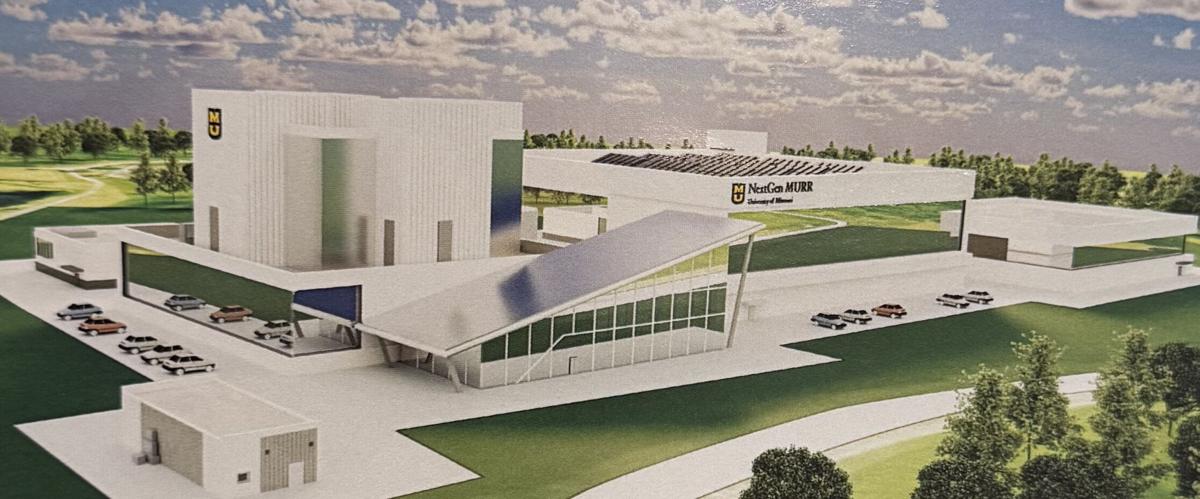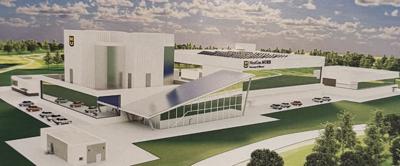COLUMBIA, Mo. ŌĆö University of Missouri leadership on Wednesday officially kicked off an ambitious project to build a 20-megawatt nuclear research reactor.
MU already has a 10-megawatt nuclear reactor, which helped facilitate several breakthroughs in cancer research. MU President Mun Choi said 450,000 people received cancer treatment that wouldnŌĆÖt have been possible without the reactor last year. It is the most powerful university research reactor in the country.
Choi touted the importance of building a new reactor at a Jesse Hall event announcing an initial $10 million agreement with Hyundai Engineering America, the Korea Atomic Energy Research Institute (KAERI), the Hyundai Engineering Company and MPR Associates to design the new facility.
The new reactor will be ŌĆ£bigger, faster and stronger,ŌĆØ Choi said. ŌĆ£ItŌĆÖll be twice as large (as the existing one), but itŌĆÖll be purpose-built for the type of radiopharmaceutical production, which wasnŌĆÖt envisioned when the first reactor was designed 60 years ago.ŌĆØ
People are also reading…
Choi said he hopes the new reactor will be complete in about eight years. It will cost about a billion dollars, which Choi said will mostly come from federal and state governments, as well as private investors.
ThatŌĆÖs all a long way away. The next few years will be filled with designing the facility and seeking regulatory approval, Michael Hoehn II, the NextGen MURR program director, said.
The state budget currently being considered by the Legislature includes $50 million for the reactor. Missouri House Budget Chair Rep. Dirk Deaton, R-Seneca, was in attendance to celebrate the project.
While state lawmakers are expected to back the project, federal funding may be more of a challenge given the Trump administrationŌĆÖs focus on cutting spending.
But former U.S. Rep. Blaine Luetkemeyer said ŌĆ£itŌĆÖs not a difficult sellŌĆØ to convince members of Congress to provide funding because of the expected impact the project will likely have on health care nationwide.
Luetkemeyer, who now serves on the MU Board of Curators, added that cancer treatment made possible by the existing reactor helped extend his fatherŌĆÖs life another 10 years.
Choi said he hasnŌĆÖt had any conversations with representatives of the Trump administration to this point but thinks the reactorŌĆÖs impact on cancer treatments nationwide is a ŌĆ£strong messageŌĆØ to convince them and members of Congress.
Tariffs are another point of contention for the project as the companies involved are based in South Korea. Choi said he is going to ŌĆ£examineŌĆØ how tariffs could affect the project but that only ŌĆ£intellectual propertyŌĆØ has been exchanged across borders so far.
Hoehn said they are working to supply what is needed for the project domestically, which ŌĆ£works well with whatŌĆÖs going on currently in the political arena.ŌĆØ
Currently, the goal is to build the reactor in South Columbia off of Highway 63, Choi said.
Tech giants Google, Amazon, and Meta have joined a coalition pledging to support the tripling of global nuclear energy capacity by 2050. The World Nuclear Association led the pledge and marks the first time major companies outside the nuclear sector have united to push for large-scale nuclear expansion. Other founding signatories include Occidental, Dow, Allseas, and OSGE. Sama Bilbao y Leon, Director General of the World Nuclear Association, said this commitment is┬Ā a "clear signal" for policy, finance, and regulatory changes to accelerate nuclear energy growth. Google's Lucia Tian stated that the company will work to commercialize advanced nuclear technologies that provide reliable, clean energy. Meta's Urvi Parekh highlighted nuclear power's role in supporting economic development with continuous electricity supply. Amazon Web Services has already invested over $1 billion in nuclear energy projects, including $500 million in small nuclear reactors. AWS Head of Americas Energy and Water Brandon Oyer said that expanding nuclear power is critical for national security, meeting future energy needs, and addressing climate change. However, Greenpeace remains opposed, arguing that nuclear plants are expensive, slow to build, and inherently unsafe, citing disasters like Chernobyl and Fukushima. Despite concerns, industry leaders assert that nuclear power is essential for sustainable energy security. UrencoŌĆÖs Laurent Odeh urged governments to enable new nuclear projects, emphasizing that reliable 24/7 power is key to balancing environmental and economic priorities.















